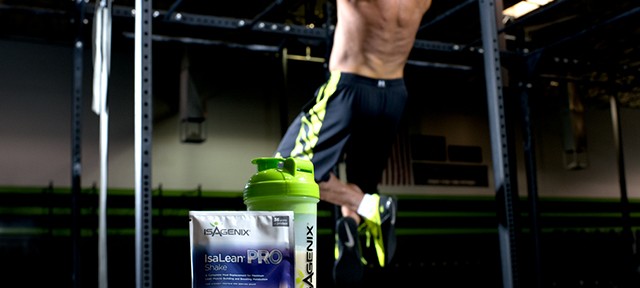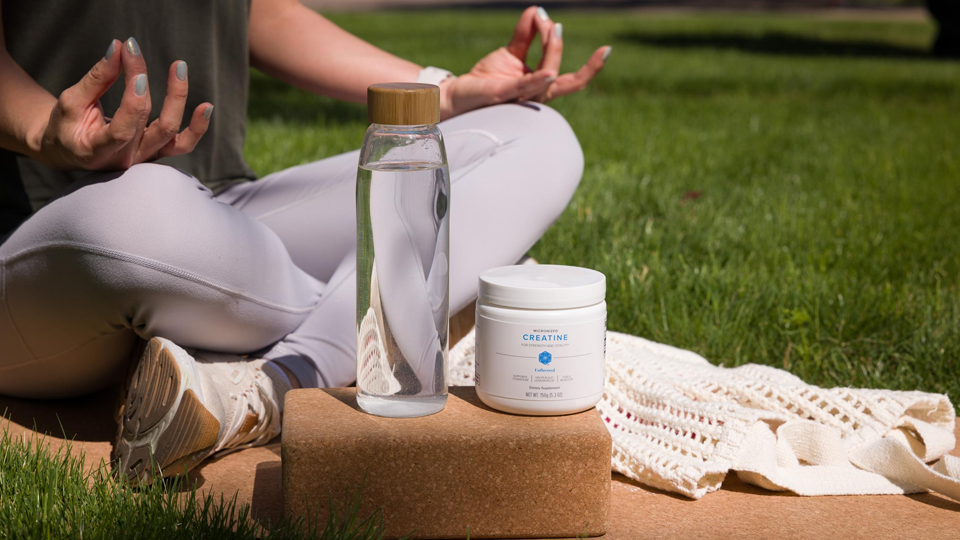The actual size of your muscle comes down to a simple equation called “protein turnover,” which is the sum of muscle breakdown and synthesis.
When you deprive your body of dietary protein and stop providing a weight-bearing stimulus, you have a negative protein balance, leading to the breakdown of muscle (1). But when you get the right type and amount of protein at the right time with a stimulus for growth like weight training, then you can build muscle and enter a positive protein balance.
The most potent way to enter a positive rate of protein turnover is protein feeding, which can effectively increase muscle synthesis for up to 24 hours (2, 3). Researchers have been intensively studying how best to increase muscle building over the last several years. They’ve found evidence showing that dose, timing, and type of protein are necessary to optimize increases in muscle mass when giving it the best stimulus through resistance training like lifting weights.
Recommended Amount of Protein
In young men with weight-lifting experience, between 20 and 40 grams of whey protein following resistance exercise was shown to optimally stimulate muscle synthesis (4). After 40 grams, muscle tissue did not better absorb whey protein. The studies suggest that there is a range for what the body can use at a certain time.
Similar to a topped-off fuel tank, the phenomenon is called the “muscle full effect,” meaning that once the muscles are saturated with protein, they are unable to handle anymore.
Forty grams is an ample dose of protein to ingest for healthy young men both at rest and after exercise regardless of training status (4-6). The takeaway is to aim for 20 to 40 grams of protein every meal, three or four times per day.
Optimal Timing for Protein Intake
Weight training can elevate muscle synthesis for at least 48 hours, but it also increases muscle breakdown, especially 24 hours after a workout (7). Weight training without protein will also ultimately lead to a negative protein turnover, resulting in muscle breakdown.
View workouts as a primer to make muscles more responsive to protein. The body is quite sensitive to protein for at least 24 to 48 hours afterward, making this the ideal time to get in multiple protein-dense meals (3-6).
Interestingly, pre-exercise protein ingestion may also prime the system and offer some advantage over post-exercise protein alone (8). However, post-exercise protein still reigns as the strongest predictor of muscle building (9).
In addition, consuming protein right before sleep provides a marked benefit to remodel and repair muscle. A recent 12-week resistance training study showed that a pre-sleep protein shake with 27.5 g protein increased muscle mass, muscle fiber area, and strength gains over a carbohydrate placebo shake (10).
In summary, the evidence suggests you should consume protein multiple times throughout the day to ensure you consume 20 to 40 grams before and after training and also before bed. Equally as important as the timing of protein intake is the type of protein you ingest.
The Superior Protein
There are major differences in the quality between the three most commonly consumed powdered protein sources: soy, casein, and whey.
Proteins like whey are digested relatively rapidly, resulting in a swift increase of amino acids—the building blocks of protein—in the blood and a larger rise in muscle synthesis than those of casein and soy (8). After consumption of casein, soy, and whey protein, the three-hour rise in muscle synthesis was found to be greatest with whey both at rest and following exercise (11).
The reason is that the amino acid profile of whey is superior, mainly due to an increased content of leucine. The amino acid is a powerful activator of the muscle-building process (11). For muscle building, whey is superior for consumption before and after workouts as well as before bed to recover and rebuild muscle tissue. Whey can also be used throughout the day to keep muscle synthesis elevated every three to four hours. In addition to whey, protein can be combined with carbohydrates to improve muscle building.
Protein Works Better With Carbs
Insulin is thought to improve net protein balance. As such, using carbohydrates helps to stimulate insulin release beyond that seen with protein alone.
Studies have shown that increased insulin by infusion at rest increases muscle synthesis and blood flow (2). When a rise in insulin is accompanied with amino acids from protein, there is not only an increase in muscle synthesis but also an attenuation of muscle breakdown beyond that of just protein ingestion or insulin infusion (12).
The protein-carb combination tips the protein turnover scale in favor of muscle building. Thereby, the evidence suggests that taking carbohydrates with protein right pre- and post-training is the most ideal time to not only enhance muscle building but also to fuel and replenish the body.
Three Muscle-Building Tips
- Consume 20 to 40 grams of protein per meal, every three to four hours throughout the day.
- Also consume protein pre- and post-workout and before bed to gain the greatest muscle-building effects. Good sources of protein include IsaPro®, IsaLean® PRO Shake, and IsaLean Shakes and Bars. You can also optimize the content of branched-chain amino acids such as leucine after workouts by taking AMPED™ Recover.
- Pair carbs with protein pre- and post-workout to halt muscle breakdown and enhance protein’s effects on muscle synthesis. Use products like AMPED Hydrate and AMPED Fuel for easily digestible and readily absorbable carbs to make the most out of your protein.
References
- Wolfe RR. The underappreciated role of muscle in health and disease. Am J Clin Nutr. 2006 Sep; 84(3):475-82.
- Biolo G et al. Increased rates of muscle protein turnover and amino acid transport after resistance exercise in humans. Am J Physiol. 1995 Mar; 268(3 Pt 1):E514-20.
- Burd NA et al. Enhanced amino acid sensitivity of myofibrillar protein synthesis persists for up to 24 h after resistance exercise in young men. J Nutr. 2011 Apr 1; 141(4):568-73.
- Witard OC. Myofibrillar muscle protein synthesis rates subsequent to a meal in response to increasing doses of whey protein at rest and after resistance exercise. Am J Clin Nutr. 2014 Jan; 99(1):86-95.
- Cuthbertson D et al. Anabolic signaling deficits underlie amino acid resistance of wasting, aging muscle. FASEB J. 2005 Mar; 19(3):422-4.
- Moore DR et al. Ingested protein dose response of muscle and albumin protein synthesis after resistance exercise in young men. Am J Clin Nutr. 2009 Jan; 89(1):161-8.
- Phillips SM et al. Mixed muscle protein synthesis and breakdown after resistance exercise in humans. Am J Physiol. 1997 Jul; 273(1 Pt 1):E99-107.
- Morton RW, McGlory C & Phillips SM. Nutritional interventions to augment resistance training-induced skeletal muscle hypertrophy. Front Physiol. 2015 Sep 3; 6:245.
- Schoenfeld BJ, Aragon AA & Krieger JW. The effect of protein timing on muscle strength and hypertrophy: a meta-analysis. J Int Soc Sports Nutr. 2013 Dec 3; 10(1):53
- Snijders T et al. Protein Ingestion before Sleep Increases Muscle Mass and Strength Gains during Prolonged Resistance-Type Exercise Training in Healthy Young Men. J Nutr. 2015 Jun; 145(6):1178-84.
- Tang JE et al. Ingestion of whey hydrolysate, casein, or soy protein isolate: effects on mixed muscle protein synthesis at rest and following resistance exercise in young men. J Appl Physiol. 2009 Sep; 107(3):987-92.
- Hillier TA et al. Extreme hyperinsulinemia unmasks insulin’s effect to stimulate protein synthesis in the human forearm. Am J Physiol. 1998 Jun; 274(6 Pt 1):E1067-74.





